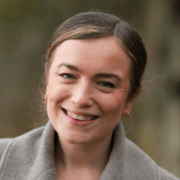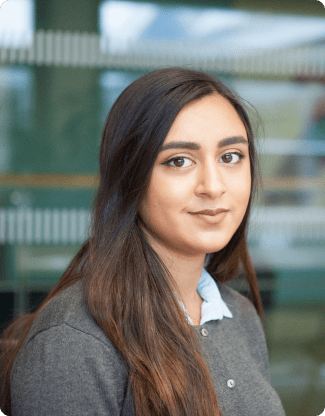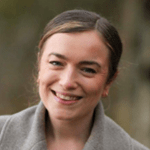Conversations for Change is a blog series that highlights exceptional people from diverse backgrounds, promoting inclusive discussions and positive global impact. Explore with us as we feature inspiring Arcadians, amplify their voices and contribute to a more inclusive and equitable future through thoughtful conversations.

Erica Snyder
How do you define Gender Equity and actively promote it in your work environment?
For me, Gender Equity, particularly in the workplace, means ensuring everyone has the opportunity to advance and thrive based on individual merit, not identity—this includes women, men and non-binary/gender expansive individuals. The results of gender equity benefit everyone. It not only empowers those who relate to the female experience, but also allows men to explore different facets of their identity without being confined by societal expectations. This, in turn, can help improve personal and professional relationships because the shift towards shared responsibilities—both at home and at work—allows everyone to participate more fully in both aspects of their lives, leading to a better work-life balance and stronger family bonds.
As a global leader of two affinity groups at Arcadis (Gender and Access & Neurodiversity), I focus a lot on intersectionality—the idea that individuals are shaped by multiple social identities that must be viewed simultaneously, rather than independently. When we understand that these various identities converge to produce unique experiences of advantage or disadvantage, we can better understand the whole person and their needs, and then provide the appropriate resources to support their success. My roles within the Affinity Groups allow me to connect with individuals around the globe; listen to their stories and experiences; and then elevate areas where we can make positive change across the organization.

In a traditionally male-dominated industry, what specific obstacles or biases have you encountered, and how did you overcome them to succeed in your career? What lessons have you learned from these experiences?
This is where intersectionality really comes into play – I have certainly had to work harder in some instances to gain traction at work, be seen as a leader and garner respect for my expertise. While these challenges are fairly common for women in a male-dominated field, they are compounded by the fact that I’m also neurodivergent.
Years ago, I acquired an autoimmune brain disorder that essentially changed the way my brain worked. One of the most significant side effects I faced was a condition called aphasia—which is essentially the inability to communicate effectively. It can impact the way you speak, write, read and understand language—a skill I had not only built my career around to date but one I had often used to bridge the gap in a highly technical and largely masculine work environment. I considered it an extremely personal betrayal by my own body, further complicated by the self-imposed drive to carry on as usual and maintain my professional status. Thankfully, with therapy and a lot of hard work, I was able to overcome this challenge and return to the career that I love, though not without some lasting effects that I’m continually learning how to either work around or work through. For years, the fear of being seen as “less than” or “incapable” kept me from sharing these challenges openly at work, which meant I had to work harder and longer to complete the necessary functions of my role—and harder still, to hide my symptoms in order to appear “normal.”. Getting involved in the Affinity Groups early on helped me realize the value in creating safe spaces at work and encouraging our people to show up authentically as their full selves. This is critical in creating a work environment where everybody can thrive.
While many of our gender and ability biases must be addressed at a societal level, I do believe self-awareness has been a key component to my personal success. I believe that my experiences, while certainly challenging at times, have also made me a more compassionate, resilient and adaptable human being, which translates into being a more effective leader. Identifying and acknowledging both my limitations and unique strengths, has allowed me to show up with confidence in the areas where I know I can provide value and then accept support or create adjustments in the areas needed. Additionally, by recognizing my own limitations, I can more fully appreciate the talents of others and then approach collaboration intentionally, aiming to maximize the unique contributions that each person brings to the team.
For anyone seeking to become more self-aware, I suggest taking the Harvard Implicit Bias assessment, which helps make your personal unconscious biases more conscious, therefore, empowering you to be more purposeful and inclusive in your everyday interactions.
What advice would you give to individuals entering the AEC industry? What was the most impactful piece of advice you've received on your journey so far?
Having spent nearly 20 years working on communications within the AEC industry, I’ve come to realize that nearly everyone working in this space is driven by a passion for improving the status-quo. Those who enter the Science, Math, Engineering, Arts and Technology (STEAM) fields are determined to make a difference in the world—to innovate, create and implement positive change. In that regard, our goals towards social justice and diversity, equity and inclusion are closely aligned. Combined, these aspirations will help us achieve a sustainable and just global culture that supports our strategic goals around accelerating a planet positive future.
I believe one of the most impactful things I’ve learned in this space is derived from a concept, rather than a direct quote. A few years back, I came across the term ‘ubuntu’ in an article and, upon further research, found within it a philosophy I’ve since aimed to live by. The Ubuntu philosophy originated in South Africa and can be roughly translated to "I am because we are." There’s something beautiful about recognizing our shared humanity and working together to build a more compassionate and equitable world. As change-makers and innovation pioneers, I believe we can work together to continue to support positive change across the industry by:
1) Committing to holding ourselves, our peers and our leaders accountable to our cultural values and beliefs.
2) Making deliberate choices to seek out diverse talent and perspectives in all our projects.
3) Regularly evaluating our outcomes from an inclusive and equitable lens, to ensure successful progress and impact.

What motivates you in your work? In your ideal world, what would best practice look like?
I really enjoy when I’m able to apply my technical skillset (design and communications) with my Affinity Group roles, using storytelling and imagery expertise to connect people, share experiences and promote engagement within the diversity and inclusion space. I’m really proud of the work we’ve accomplished in our global affinity groups to date, which includes establishing and coordinating a specialized Women of Color program, creating a Neurodiversity in the Workplace Guidebook and, most recently, organizing efforts for Arcadis to become a member of the Valuable 500, an organization that connects senior leaders across large organizations, to promote best practices and share insights focused on accessible workplaces. These projects have real impact on the daily work lives of our people within the organization and demonstrate the power of change we can make when we all come together.
Leading up to Global Accessibility Awareness Day (GAAD, May 16), the best practice I’d really like everyone—but especially designers, architects, engineers, scientists and all-around problem-solvers—to consider is focused on inclusive design. Our organizational aspirations to improve quality of life should aim to meet the needs of 100% of the population, and no less. We can choose to be more mindful about ensuring everyone can access the products and services we provide by considering the multiple cross-identity benefits that result from accessible, inclusive design. For example, wheelchair ramps not only serve the disabled community, but also improve access for parents with strollers, package delivery services, movers and anyone else navigating on wheels. Office quiet rooms can be used by those wishing to practice their faith, as well as neurodivergent individuals needing a sensory break or nursing mothers seeking privacy. Inclusive design practices are a fundamental aspect of empowering ALL individuals to fully participate in society and I would really love to see these considerations become a standard part of all solutions, rather than the exception.
What excites you about this year’s IWD theme of ‘Allyship & Inclusion’? Regarding gender equity, what change would you like to see in the next 10 years?
Embracing allyship is critical in accomplishing our goals towards gender parity and creating a more inclusive and accessible world overall. One of our external speakers for International Women’s Day spoke about the concept of “aspiring allyship,” which really resonated with me in the sense that allyship is a lifelong journey and not a one-size-fits-all approach. As aspiring allies, we begin by acknowledging our privilege and then progress by using it to call out injustices and amplify the voices and experiences of those in underrepresented groups. Allyship is a key component in fostering community and psychologically safe spaces at work, ultimately leading to an enhanced and inclusive work environment that promotes innovation, engagement and high performance.
Moving forward, I see Gender Equity as a launching point to elevate all underrepresented groups. The challenges that stem from gender inequity are a known global issue of high priority, and awareness has increased at a steady rate in recent years. As intersectional beings, I hope to see us use the traction we’ve gained in this space to set a precedent for progress in other areas like accessibility and neurodiversity, ethnicity and heritage, LGBTQIA+ and age.







